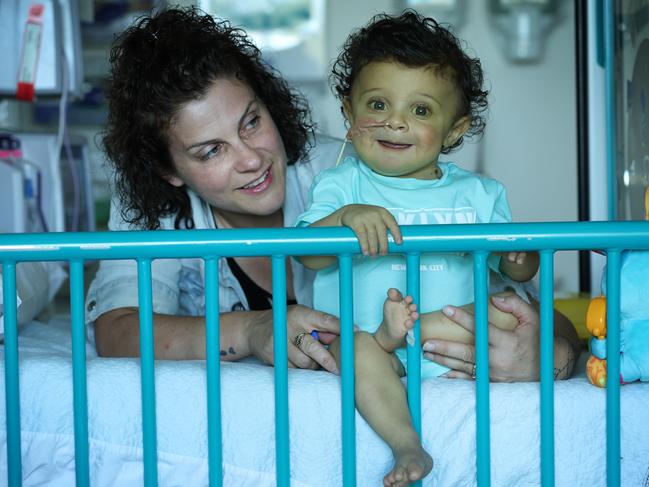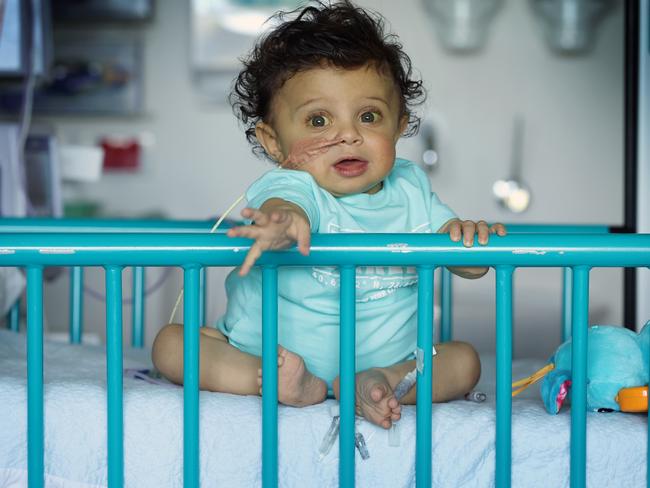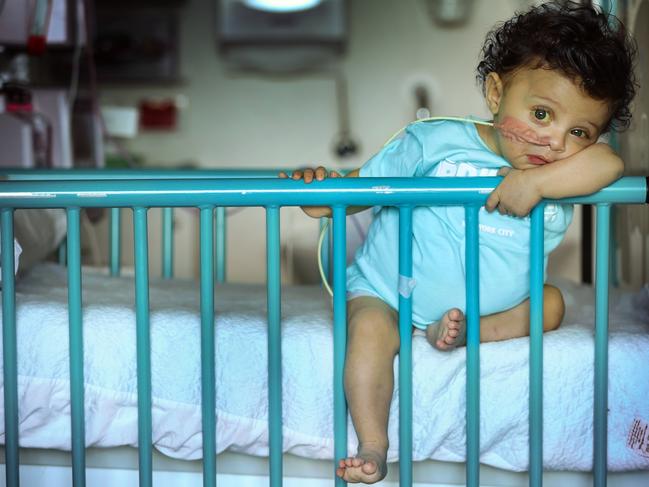Melbourne mum offers to donate part of her liver to save baby’s life
Harlen Busuttil has been on the waitlist for a new liver since September. As his condition deteriorates, his loving mum is preparing to donate part of hers.
Victoria
Don't miss out on the headlines from Victoria. Followed categories will be added to My News.
Kristy Busuttil will do “whatever it takes” to save her son’s life. And as 16-month-old Harlen enters his fifth month on the waitlist for a liver transplant, it’s increasingly likely that will mean donating part of hers.
“If he doesn’t get a transplant, then eventually he’ll go into liver failure and he won’t make it,” Ms Busuttil said through tears.
“So around Christmas, I asked the team, ‘can I see if I’m match? Are we at that point?’ And they said, ‘yeah, we’re at that point’. Luckily, I’m a match but that’s the last resort, obviously.
“(Medical professionals) are giving him until the start of February for a deceased donor to come through, as long as something major doesn’t happen. And then, I’ll be the one to donate.
“Of course I would do whatever it takes to save his life.”
If this eventuates, Ms Busuttil – a mother of four and Commonwealth Games gold medallist in taekwondo – will be in rare company. The most recent data from Australia’s Organ and Tissue Authority shows there was just one partial liver donation in both 2020 and 2021, and none in 2022.

Harlen was diagnosed at eight weeks old with biliary atresia – a rare disease in infants that blocks and scars bile ducts in the liver – and underwent an emergency Kasai procedure at Melbourne’s Royal Children’s Hospital soon after.
Devastatingly for Ms Busuttil and husband Matt, from Altona in Melbourne’s west, the surgery did not have the desired outcome of improving bile flow. This left liver transplantation as Harlen’s only option.
“I was just beside myself,” Ms Busuttil said of the diagnosis.
“He was jaundiced from birth and it wasn’t clearing up. I flagged it with numerous nurses and doctors and they said, ‘oh no, it’ll go away’. I got to his eight-week maternal child health appointment and the nurse said, ‘he’s completely orange, I think you need to go to the hospital’.
“Next minute, we’re being told our son has a liver disease and may need a liver transplant.”
Harlen joined the organ transplant waitlist in September. He is one of about 1800 Australians on this list, 112 of whom are waiting for a liver.
“We’ve been at the top of the list in Victoria for about six weeks and nothing has come through,” Ms Busuttil said.
“We’ve even opened ourselves up to other blood groups, which has risk associated with it, not being an exact match. But (the medical team) said they can deal with that.”


Waiting for the call to say a match has been found for Harlen has been agony for his family.
“You don’t sleep because you think the call is coming. You have to make sure your phone is fully charged and right next to you,” Ms Busuttil said.
“You can’t plan anything, either. You don’t know what the next day is going to bring.”
Complications with his condition that led to internal bleeding saw Harlen admitted to the Royal Children’s Hospital in mid December. He had to be placed in an induced coma for about a week, so doctors could insert and then deflate a balloon in his stomach to stop the bleeding.
He made it home for about three hours on Christmas Eve before having to be rushed back to the ward, and it has now been deemed “too risky” for him to leave until he receives his transplant.
Harlen’s parents and siblings – Logan, 12, Scarlet, 7, and Owen, 5 – spent Christmas together in his hospital room.
Ms Busuttil said she and Matt had been by Harlen’s bedside for “basically 24-hour shifts” since he was admitted, juggling work and looking after their other children when they weren’t in the hospital.
Logan “kind of understands everything and is obviously really worried”, Scarlet “misses (Harlen) not being at home” and Owen was starting to “struggle a little bit emotionally”. “But they’re pretty resilient,” she added.
“Harlen gets very excited when they come in to see him, bouncing around his cot, screaming, cuddling and holding their faces,” she said. “We do a lot of FaceTime, too.
“He’s such a happy little fella that you wouldn’t even know he was sick. He can’t walk or crawl because his tummy is so enlarged, but he’s worked out how to get around by scooting. He loves Baby Shark and dancing.
“He’s just a tough little guy. He puts up with so much. It’s pretty unbelievable.”
After enduring major operations, liver biopsies, blood and blood product transfusions, blood tests, medications, ultrasounds, CT and MRI scans, having to be fed through a nasogastric tube every night, and more in his first 16 months, a transplant would be “life-changing” as well as lifesaving for Harlen.
Startled to learn how rare donation is in Australia, the Busuttil family hope Harlen’s story will encourage people to register as organ and tissue donors. Anyone aged 16-plus can do so by filling out a short form at donatelife.gov.au or with three taps in the Medicare app.
“I don’t think people realise how simple it is – it’s just ticking a box,” Ms Busuttil said. “We can’t take it with us, and you can give somebody life, a future.”
DonateLife Victoria medical director Dr Rohit D’Costa said: “Only 2 per cent of people who die in Australian hospitals meet the criteria required to be an organ donor. (So) increasing consent is critical to increasing our donation rate.
“It’s so important for people to register and tell their loved ones they want to be a donor (as) your family will always be asked to consent to donation on your behalf.”
In 2022, 454 Australians donated organs to 1224 recipients.
Organ and tissue donation facts:
-About 1800 Australians are on the waitlist for an immediate organ transplant, 112 are waiting for a liver.
-1224 Australians received organ transplants from 454 deceased donors in 2022, including 260 liver transplants.
-Less than 2 per cent of people die in Australian hospitals in a way that organ donation is possible. Their families must then consent to them becoming donors.
-Nine in 10 families say ‘yes’ to donation when their loved one is registered, six in 10 if they had discussed donation with their loved one, but only four in 10 agree when a loved one’s wishes aren’t known.
-Anyone aged 16-plus can join the Australian Organ Donor Register – no one is too old, unhealthy or unwell to sign up, and all major religions and cultures in Australia support organ donation as an act of compassion and generosity.
-One organ donor can save the lives of up to seven people and help many more through eye and tissue donation.
Source: DonateLife



